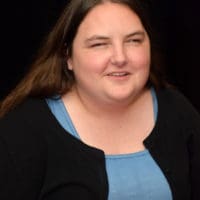This is an interview blog with Claire Stanley, America Walks’ newest Board Member. Claire is a Public Policy Analyst with the National Disability Rights Network, having moved recently from the American Council of the Blind, where she advocated for the rights of blind and visually impaired persons, both on a direct level as well as on Capitol Hill.
After receiving her law degree from the University of California Irvine in 2015, Ms. Stanley was a public interest legal fellow with Disability Right D.C. at University Legal Services. She trained businesses and organizations about the intricacies of the Americans with Disabilities Act for the Mid-Atlantic ADA Center. As a person with a disability, Ms. Stanley believes strongly in the rights of all persons with disabilities. Read her full bio here.
Why are walkable communities important to you?
I grew up in southern California. Why am I telling you this? I’m telling you this because southern California is a perfect example of an American community built around a culture of driving. When one turns 16, he or she rushes to the DMV to take the “magic” test to get his or her license. And getting your license opens the world to freedom. Because it’s a car culture, one cannot go many places without a car: everything is spread out and lacks walking friendly routes. So, because I am blind and unable to drive, I left southern California as soon as I could. I wanted to live somewhere where I could walk everywhere, where public transportation was easily available, and where things like grocery stores, restaurants, and apartment buildings were close together.
Walkability, as someone who is blind, is so important because it literally opens up the world to me. When things are walkable, I can more easily access them. I want to be independent. I want to be able to go where I want when I want. But if I cannot drive, I need to be able to access the world via foot. And I know this desire is not unique to me. I know people with all kinds of disabilities who want to live in such communities. And I would even venture to think that people of different backgrounds, socioeconomic groups, and ethnicities have similar feelings.
Are there ways you see walkability intersecting with social justice issues?
Absolutely! As a person with a disability, I have to advocate for accessibility on a daily basis. Those of us with disabilities live in a world that was designed for the nondisabled; accessibility is often an afterthought. Walkability is an example of a design that often thinks about the nondisabled before the disabled. We want communities and streets to be friendly to the pedestrian. But we need to think even bigger than that. If a community is truly accessible to all pedestrians, accessibility for persons literally has to be built into the framework of the infrastructure. I am blind. To cross streets safely, the inclusion of accessible pedestrian signals (APS) is often an important feature. But, many streets do not include them. Legally, although required in some situations, they are not mandatory in all places. Cities often complain that they are too costly and cumbersome to install. But, if we want to make a community walkable, such accommodations are essential.
So yes, there is a clear intersection between walkability and social justice. To make a community walkable to all people groups, we need to think bigger than just the basic concepts of walkability. I bet there are so many more variables than any one person could think of.
If you could go for a walk with any living person, who would it be?
When I was pondering over this question, I kept thinking I should pick someone famous, or someone who yields significant authority in the world. But as I really thought about it, I realized, I would probably just want to take a walk with someone I have known from an earlier time in my life, someone who played a role in helping to shape me into who I am. Now, that could be many people. I have been blessed to interact with so many people from so many different places and backgrounds who have taught me about life and myself. I say that as a preface because my answer, with this thought in mind, could probably change from day to day.
But with all that background in place, I would probably want to go on a walk with counselors from a camp I went to growing up. As a kid, I went to a pediatric oncology camp for kids who had cancer: we affectionately called it cancer camp. Anyway, I had so many amazing counselors and fellow campers who were so giving and so amazing. I think, instead of meeting with some past president or CEO of a major company, I rather just take a walk with an old friend who I met when I was much younger who just helped me learn about life and more about myself. Those are the people who really impacted my life.

